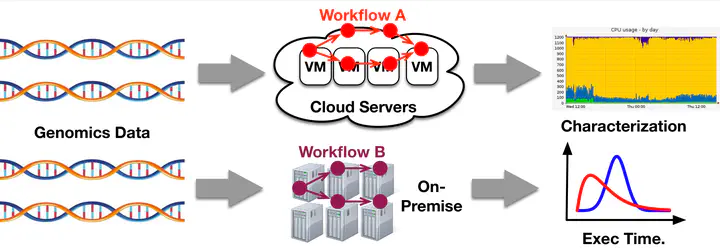Reproducible Performance Benchmarking for Genomics Workflows on HPC Cluster

Project Idea description
We aim to characterize the performance of genomic workflows on HPC clusters by conducting two research activities using a broad set of state-of-the-art genomic applications and open-source datasets.
Performance Benchmarking and Characterizing Genomic Workflows:
- Topics: High Performance Computing (HPC), Data Analysis, Scientific Workflows
- Skills: Linux, Python, Bash Scripting, Data Science Toolkit, Kubernetes, Container Orchestration, Genomics Applications (e.g. BWA, FastQC, Picard, GATK, STAR)
- Difficulty: Medium
- Size: Large (350 hours)
- Mentor(s): In Kee Kim
In this activity, students will perform comprehensive performance measurements of genomic data processing on HPC clusters using state-of-the-art applications, workflows, and real-world datasets. They will collect and package datasets for I/O, memory, and compute utilization using industry-standard tools and best practices. Measurement will be done using Kubernetes container orchestration on a multi-node cluster to achieve scalability, with either custom-made metrics collection system or integration of existing industry standard tools. (e.g. Prometheus).
Quantifying Performance Interference and Assessing Their Impact on Workflow Execution Time:
- Topics: Machine Learning, Data Analysis, and Scientific Workflows and Computations
- Skills: Linux, Python, Bash Scripting, Data Science Toolkit, Kubernetes, Container Orchestration
- Difficulty: Difficult
- Size: Medium (175 hours)
- Mentor(s): In Kee Kim
In this activity, students will measure the slowdown of various applications due to resource contention (e.g. CPU and I/O). Students will analyze whether an application is compute-bound, I/O bound, or both, then analyze the correlation between resource utilization and execution time. Following that, students will assess the impact of per-application slowdown to the slowdown of a whole workflow. To the best of our knowledge, this will be the first study which systematically quantifies per-application interference when running genomics workflow on an HPC cluster.
For both subprojects, all experiments will also be conducted in a reproducible manner (e.g., as a Trovi package or Chameleon VM images), and all code will be open-sourced (e.g., shared on a public Github repo).
Project Deliverable:
A Github repository and/or Chameleon VM image containing source code for application executions & metrics collection. Jupyter notebooks and/or Trovi artifacts containing analysis and mathematical models for application resource utilization & the effects of data quality.